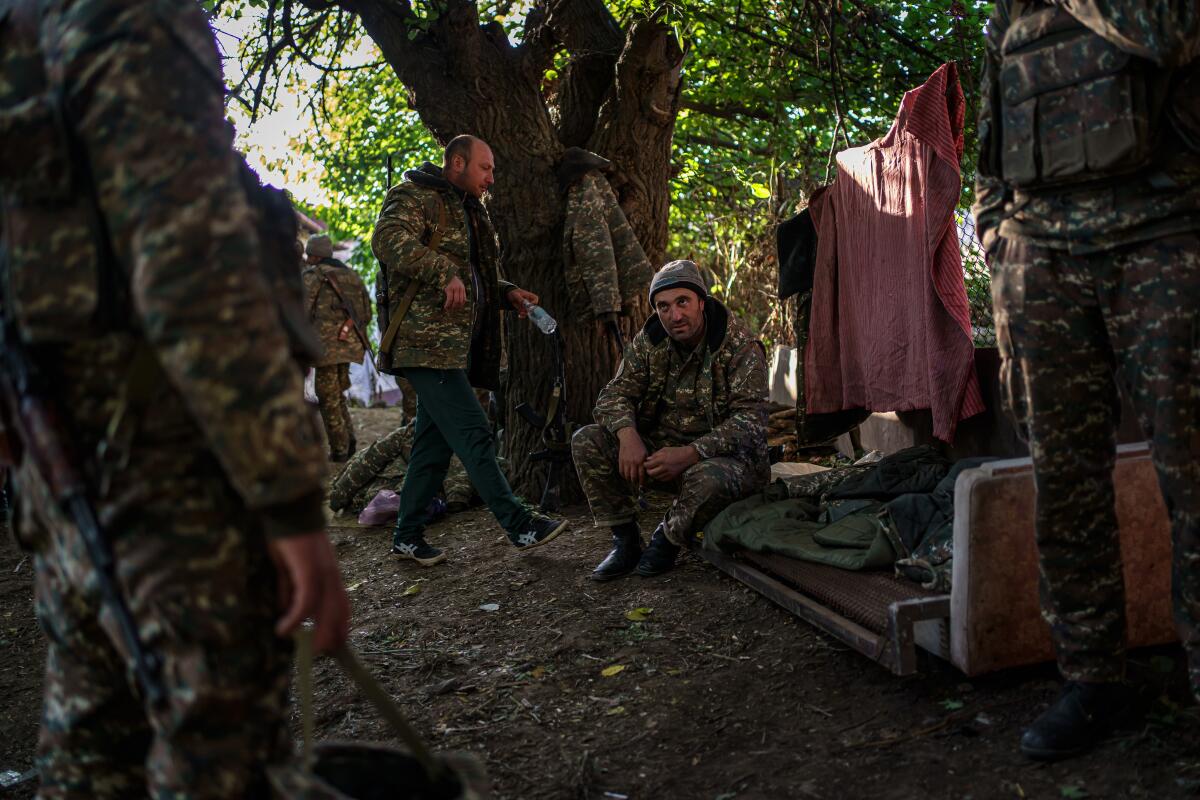Ally backs Azerbaijan with aim to ‘Make Turkey Great Again’

Nearly two decades ago, after Turkish President Recep Tayyip Erdogan’s political party came to power, it formulated a foreign policy summed up by the succinct phrase: “Zero problems with neighbors.”
But these days, it’s hard to find a conflict anywhere in Turkey’s extended neighborhood — the Middle East, North Africa, the eastern Mediterranean — in which Erdogan’s government does not play some role.
Now Turkey is a driving force behind the fight over Nagorno-Karabakh, an ethnic Armenian enclave situated inside Azerbaijan, Turkey’s close ally. Since the latest hostilities erupted on Sept. 27, Erdogan’s government has cheered on its “Turkic brothers” and brusquely rejected appeals from European allies in the North Atlantic Treaty Organization, who urge a negotiated settlement.
It might seem like an odd time for Erdogan, whose personal popularity has waned as he resorts to increasingly authoritarian measures to ensure his grip on power, to plunge into yet another ugly and complex regional quarrel. But the 66-year-old leader and his Justice and Development Party, or AKP, have a long history of playing the nationalist card whenever discontent at home is on the rise.
“This all fits with the domestic rhetoric of Erdogan and the AKP, to ‘make Turkey great again,’” said Sinan Ulgen, a visiting scholar with the think tank Carnegie Europe.
In some ways, the conflict is a welcome distraction for Erdogan. Even before the coronavirus outbreak hit, Turkey’s once-booming economy had faltered, and as elsewhere, the public health crisis aggravated fiscal woes. As the pandemic has worsened, with the country’s death toll approaching 10,000, the government’s disorganized COVID-19 response was poorly received even by a traditionally supportive business community.
At a moment like this, Azerbaijan, with its close linguistic and ethnic ties to Turkey, makes for a perfect cause celebre, said Alan Makovsky of the Center for American Progress, a Washington think tank — just as next-door Armenia, with whom relations are historically hostile, makes for a perfect foil.
“When you look at polls of which countries Turks consider their friends, Azerbaijan is always at the top,” Makovsky said.
Turkish media, largely loyal to the government after years of official attacks on independent outlets, have glorified Azerbaijan’s exploits in the battle for Nagorno-Karabakh, which ethnic Armenians call the Republic of Artsakh.
As the fighting escalates, many analysts point to the culmination of a military partnership that has been decades in the making.
Turkey has played an immense role in helping build Azerbaijan’s military. The Caucasus nation was outmatched against Armenia when the two fought their last big battle, in the years before and after the 1991 breakup of the Soviet Union.
Svante Cornell, director of the Central Asia-Caucasus Institute, said Azerbaijan “learned the lesson that failure to organize a proper military force was the reason they lost.” That conflict ended in a shaky 1994 truce.
Aided in recent years by a windfall of energy revenue, Azerbaijan set about systematically developing its military strength. Turkey stepped in with structural support, sophisticated training and a raft of arms sales, to dramatic effect.
“There is a clear imprint of the Turkish military on Azerbaijan,” Cornell said.
As in Libya and Syria, the Nagorno-Karabakh conflict has been a proxy staging ground for Turkey’s long-running rivalry with Russia, which has a defense alliance with Armenia and a military base in the country. Some analysts see authoritarian leaders like Erdogan as seizing a moment of waning U.S. and European influence to act.
“It’s obvious that Erdogan has ambition to position Turkey as a regional leader, and he hasn’t hit a wall yet,” said Nicu Popescu, an analyst with the European Council on Foreign Relations. He likened Turkey’s bid for influence in the southern Caucasus, Russia’s backyard, to Moscow’s entanglements in Syria and Libya, which are more in Turkey’s immediate sphere.
“It’s a gold-rush mentality,” Popescu said. “You go, you move fast, you mark your territory. If you need to punch some noses in the process, you do it, but you grab as much terrain as you can.”
Despite decades of enmity between Armenia and Azerbaijan, the latest fighting almost certainly did not break out spontaneously, said Ezgi Yazici, who has analyzed the Nagorno-Karabakh conflict for the Washington-based Institute for the Study of War.
Turkey and the government in the Azerbaijani capital, Baku, “likely prepared and coordinated for a potential Azerbaijani intervention to dispute Armenia’s claim in Nagorno-Karabakh for months with Turkish drone sales, joint military drills, and reported Syrian proxy mobilization to Azerbaijan,” Yazici wrote in an email. “Even if Azerbaijan decided on its own to launch an offensive, Erdogan’s actions certainly facilitated and likely encouraged Azerbaijani action.”
The Turkish leader has made little secret of a broader agenda, characterizing his government’s stance as an expression of its “deserved place in the world order.” Both by backing Azerbaijan in the current fighting and by claiming a role in brokering any eventual peace, Turkey’s leader sees an opportunity to enhance his prestige, Ulgen said.
“It allows Turkey to make a case to the international community that it has become more influential, more important,” he said.
In the battle zones, of course, the question of regional jockeying is far from theoretical. With civilian casualties mounting, Armenia on Thursday accused Turkey of preventing aircraft carrying emergency assistance from flying over its territory, and aid groups warned of a looming humanitarian crisis.
Popescu predicted that ultimately, Armenia might agree to relinquish some territory around Nagorno-Karabakh. But any settlement is unlikely to be in line with maximalist demands made by Azerbaijan’s leaders, with Turkey’s support, including a call for Armenian forces to leave the enclave, Ulgen said.
“That’s not very realistic,” he said. “The object for Turkey is to reposition, to prepare for political negotiations — to have a seat at the table.”
More to Read
Sign up for Essential California
The most important California stories and recommendations in your inbox every morning.
You may occasionally receive promotional content from the Los Angeles Times.










